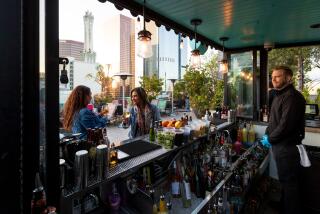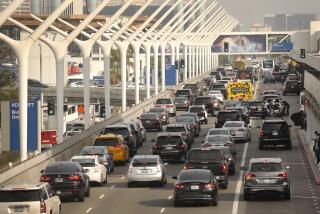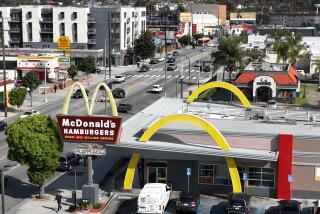Airport food prices can eat up your budget
Travelers may grumble about the high cost of flying, with charges for bags, seat selection and other services that once were free. But for many fliers, the fleecing starts at the airport, where they often face higher prices and fees for food, beverages, car rentals and taxi rides.
Some expenses are tough to dodge. If you’re juggling lots of luggage, you may need a taxi. Although off-airport outlets typically charge less for car rentals, you’ll burn through money and time getting to them. With preparation, however, you can keep airport food prices from chomping through your wallet.
And chomp they may. At Los Angeles International Airport, I found a McDonald’s charging $7.19 for a Quarter Pounder meal with fries and soft drink, compared with $5.69 at a McDonald’s outlet downtown; large fries cost $2.89 at LAX and $2.29 downtown.
The Daily Grill at LAX charged the same prices for lunch and dinner. So instead of charging $17.95 for a salmon entree at lunch and $23.95 for the same entree at dinner, as the downtown Los Angeles Daily Grill did, it charged $23.95 all day.
Some ways to save on food:
Think ahead: “If you’re flying at 1 a.m. … eat before you leave for the airport,” said Chris Crowley, president of the Assn. of Corporate Travel Executives, which represents corporate travel managers and suppliers in dozens of countries. I would add: even if you’re not flying at odd hours. You never know when a flight delay or cancellation will trap you in a terminal.
Carry food from home: Sandwiches (hold the mayo), fruit, nuts, protein bars — anything that’s portable, nutritious and not too messy or perishable. I usually pack my provisions in a collapsible, insulated bag that I can stuff into my carry-on. Even for a short flight, take something to eat in case you get delayed. On the way back, buy food in town to pack for the airport and plane.
Tote an empty: Limits on carrying liquids through Transportation Security Administration checkpoints turn unprepared fliers into captive customers of airport vendors. So take an empty bottle through security and then fill it at a water fountain or washroom tap (not an airline lavatory tap, though).
Pray for “street pricing”: Many airports allow vendors in terminals to charge 10% or more above so-called street pricing — essentially, what the retailer charges outside the airport.
At LAX, the latest proposed concessions contract permits 18% markups because “generally the cost of doing business at an airport is significantly higher than operating at a mall or street location,” LAX spokesman Albert Rodriguez said.
When I asked why costs are higher, he cited pricier leases. Others in the industry said security clearances, multiple shifts to cover longer operating hours and other factors also make airport outlets more expensive to run.
Rodriguez added: “LAX is currently trying to revamp its rates to make them closer to street pricing, but that doesn’t affect the current contract.”
At many other U.S. airports, retailers already offer street pricing. Among them are Baltimore Washington International, Cleveland Hopkins International, Pittsburgh International and Terminals B and E at Boston Logan International — all locations where concessions are overseen by a company called BAA USA, based at the Baltimore airport.
Each airport may calculate street pricing differently. At Pittsburgh, it’s determined by the Allegheny County controller in an annual audit, airport spokeswoman JoAnn Jenny said. The LAX contract looks at “comparable locations at regional malls and prominent shopping streets within 25 miles of LAX,” Rodriguez said. BAA USA checks the nearest off-airport outlet for each store, said Jay Kruisselbrink, the company’s vice president for development.
BAA USA leases space from airports and rents it to independent retail tenants, which Kruisselbrink said promotes competition and helps keep prices low. He also contended that regular, robust passenger traffic offsets any added costs for airport retailers.
“Customers know when they’re being ripped off,” Kruisselbrink said.
If you feel that way, it pays to take evasive action.
More to Read
Sign up for The Wild
We’ll help you find the best places to hike, bike and run, as well as the perfect silent spots for meditation and yoga.
You may occasionally receive promotional content from the Los Angeles Times.






